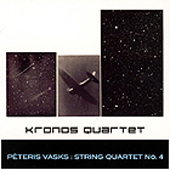
DEFINITIVE RECORDINGS

Peteris Vasks was born in Latvia in 1946, and still lives and composes in the Latvian capital city of Riga. This Fourth String Quartet was commissioned for the Kronos Quartet.
It was written in 1999, and premiered in May of 2000. It is a work that perfectly encapsulates the 20th century. Although it does belong to the sound world of 1999, it could also
have been written in 1901. It speaks with a universal language that transcends time and style, and reveals its emotional content and spiritual message very clearly.
The first movement, Elegy, begins quietly as if from nothingness, but quickly develops around various motifs, showcasing the quartet as a whole very well. The mood
is generally sad and plaintive, but seems to be driven towards the hope of something new. The following three movements run the gamut from tense and ironic, influenced by Shostakovich,
to long moments of lyrical beauty and intense emotions.
Meditation, the fifth and closing movement, is built around a long and plaintive song by the violin, soaring high above the other instruments, while they seem to be
singing together as a choir, creating a perfect background to the violin's prayer. At the end, the music returns to the silence from which it came.
A wonderful example of a modern piece of music that does not try to be different to impress, but does impress by being familiar. And of course, specialists in this type of repertoire,
the Kronos Quartet, play this music with the right blend of intellect and heart, and emphasize the message behind the notes, which gives the music its life and internal
light.
The CD liner notes contain the following words by Peteris Vasks himself, which capture the essence of this quartet very well: When I think about contemporary life,
it's impossible not to realize that we are balanced on the edge of time's end. It's frighteningly close. But is there any point to composing a piece that only mirrors our being one
step away from extinction? To my mind, every honest
composer searches for a way out of his time's crises. Towards affirmation, towards faith. He shows how humanity can overcome this passion for self-annihilation that flares up in a
column of black smoke from time to time. And if I can find this way out, a reason for hope, the outline of a perspective, then I offer it as my model.
Jean-Yves Duperron